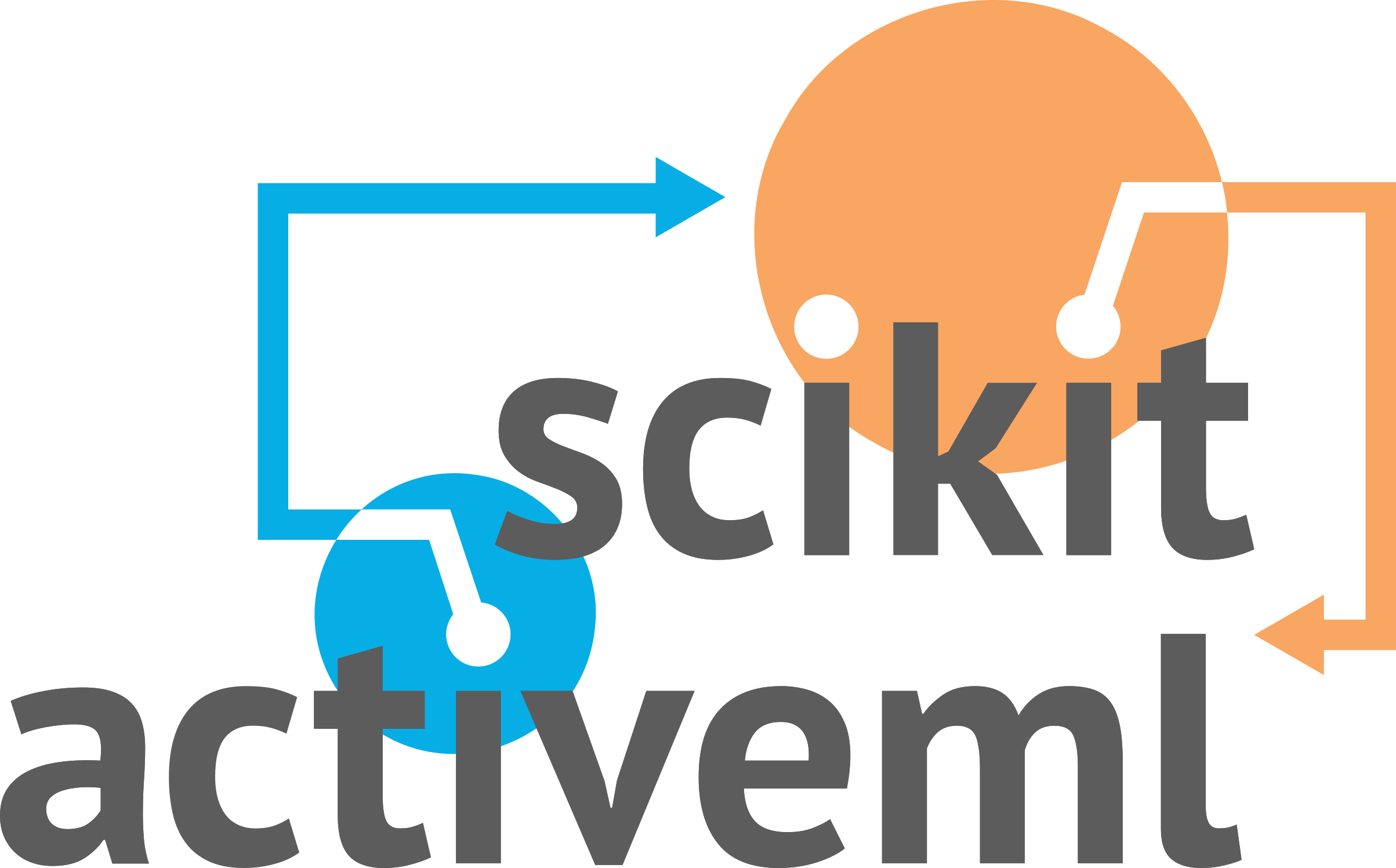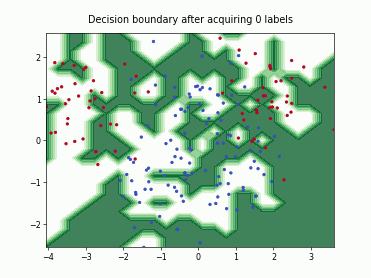UncertaintySampling#
- class skactiveml.pool.UncertaintySampling(method='least_confident', cost_matrix=None, missing_label=nan, random_state=None)[source]#
Bases:
SingleAnnotatorPoolQueryStrategyUncertainty Sampling (US)
This class implement various uncertainty based query strategies, i.e., the standard uncertainty measures [1], cost-sensitive ones [2], and one optimizing expected average precision [3]. Concretely, four uncertainty score definitions are available:
least confident [1] selecting samples whose predicted top class has the lowest confidence,
margin sampling [1] selecting samples where the gap between the two most probable classes is smallest,
entropy-based uncertainty [1] selecting samples with the highest overall predictive uncertainty across classes,
and expected average precision [3] selecting samples with the highest expected improvement in average precision under the model’s current predictions.
For the least confident and margin sampling cost-sensitive variants are implemented considering a user-defined cost matrix [2]. Finally, the class can also be leverage to implement variants of density-weighted uncertainty sampling (DWUS) and the dual strategy for active learning (DUAL) [4].
- Parameters:
- method‘least_confident’ or ‘margin’ or ‘entropy’ or ‘expected_average_precision’, default=’least_confident’
The method to calculate the uncertainty.
- cost_matrixarray-like of shape (n_classes, n_classes)
Cost matrix with cost_matrix[i,j] defining the cost of predicting class j for a sample with the actual class i. Only supported for least_confident and margin_sampling variant.
- missing_labelscalar or string or np.nan or None, default=np.nan
Value to represent a missing label.
- random_stateint or np.random.RandomState
The random state to use.
References
[1] (1,2,3,4)Settles, Burr. Active learning literature survey. University of Wisconsin-Madison Department of Computer Sciences, 2009.
[2] (1,2)P.-L. Chen and H.-T. Lin. Active Learning for Multiclass Cost-Sensitive Classification Using Probabilistic Models. In Conf. Technol. Appl. Artif. Intell., pages 13–18, 2013.
[3]H. Wang, X. Chang, L. Shi, Y. Yang, and Y.-D. Shen. Uncertainty Sampling for Action Recognition via Maximizing Expected Average Precision. In Int. Jt. Conf. Artif. Intell., pages 964–970, 2018.
[4]P. Donmez, J. G. Carbonell, and P. N. Bennett. Dual Strategy Active Learning. In Eur. Conf. Mach. Learn, pages 116-127, 2007.
Methods
Get metadata routing of this object.
get_params([deep])Get parameters for this estimator.
query(X, y, clf[, fit_clf, sample_weight, ...])Determines for which candidate samples labels are to be queried.
set_params(**params)Set the parameters of this estimator.
- get_metadata_routing()#
Get metadata routing of this object.
Please check User Guide on how the routing mechanism works.
- Returns:
- routingMetadataRequest
A
MetadataRequestencapsulating routing information.
- get_params(deep=True)#
Get parameters for this estimator.
- Parameters:
- deepbool, default=True
If True, will return the parameters for this estimator and contained subobjects that are estimators.
- Returns:
- paramsdict
Parameter names mapped to their values.
- query(X, y, clf, fit_clf=True, sample_weight=None, utility_weight=None, candidates=None, batch_size=1, return_utilities=False)[source]#
Determines for which candidate samples labels are to be queried.
- Parameters:
- Xarray-like of shape (n_samples, n_features)
Training data set, usually complete, i.e., including the labeled and unlabeled samples.
- yarray-like of shape (n_samples,)
Labels of the training data set (possibly including unlabeled ones indicated by self.missing_label).
- clfskactiveml.base.SkactivemlClassifier
Model implementing the methods fit and predict_proba.
- fit_clfbool, default=True
Defines whether the classifier should be fitted on X, y, and sample_weight.
- sample_weightarray-like of shape (n_samples,), default=None
Weights of training samples in X.
- utility_weightarray-like, default=None
Weight for each candidate (multiplied with utilities). Usually, this is to be the density of a candidate. The length of utility_weight is usually n_samples, except for the case when candidates contains samples (ndim >= 2). Then the length is n_candidates.
- candidatesNone or array-like of shape (n_candidates), dtype=int or array-like of shape (n_candidates, n_features), default=None
If candidates is None, the unlabeled samples from (X,y) are considered as candidates.
If candidates is of shape (n_candidates,) and of type int, candidates is considered as the indices of the samples in (X,y).
If candidates is of shape (n_candidates, …), the candidate samples are directly given in candidates (not necessarily contained in X).
- batch_sizeint, default=1
The number of samples to be selected in one AL cycle.
- return_utilitiesbool, default=False
If true, also return the utilities based on the query strategy.
- Returns:
- query_indicesnumpy.ndarray of shape (batch_size)
The query indices indicate for which candidate sample a label is to be queried, e.g., query_indices[0] indicates the first selected sample.
If candidates is None or of shape (n_candidates,), the indexing refers to the samples in X.
If candidates is of shape (n_candidates, n_features), the indexing refers to the samples in candidates.
- utilitiesnumpy.ndarray of shape (batch_size, n_samples)
The utilities of samples after each selected sample of the batch, e.g., utilities[0] indicates the utilities used for selecting the first sample (with index query_indices[0]) of the batch. Utilities for labeled samples will be set to np.nan.
If candidates is None, the indexing refers to the samples in X.
If candidates is of shape (n_candidates,) and of type int, utilities refers to the samples in X.
If candidates is of shape (n_candidates, …), utilities refers to the indexing in candidates.
- set_params(**params)#
Set the parameters of this estimator.
The method works on simple estimators as well as on nested objects (such as
Pipeline). The latter have parameters of the form<component>__<parameter>so that it’s possible to update each component of a nested object.- Parameters:
- **paramsdict
Estimator parameters.
- Returns:
- selfestimator instance
Estimator instance.
Examples using skactiveml.pool.UncertaintySampling#

Uncertainty Sampling with Expected Average Precision (USAP)






